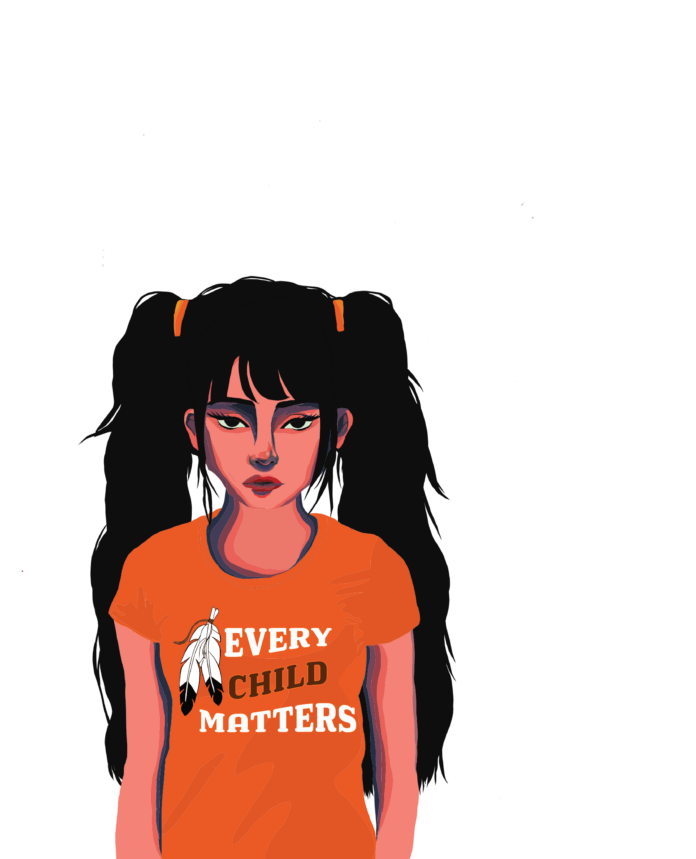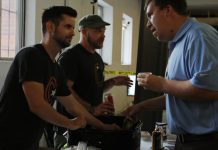Sept. 30 marks the first National Day for Truth and Reconciliation in Canada — a federal holiday created by the Canadian government in June 2021.
The announcement of the holiday came after the findings of 215 children buried at the former Kamloops Indian Residential School in May.
Established in the late 1870s, residential schools were an effort by the Canadian government to assimilate Indigenous children and erase their culture. Many people dismiss these atrocities as ‘ancient history’, when in reality the schools were open as recently as 1996. It is estimated that more than 150,000 First Nations, Inuit and Métis children attended these schools, where rates of abuse were high and many children never saw their families again.
Sept. 30 also marks Orange Shirt Day, a day of recognition based on the story of residential school survivor Phyllis Webstad. Webstad was sent to St. Joseph Mission Residential School at six years old. The only item she had to remember her family by was an orange shirt that her grandmother had given her, and it was quickly taken away. For many Indigenous people, the colour orange has come to represent how their culture and way of life was stolen.
“This holiday is not new — it’s elevated from a grassroots movement,” said Robin Stadelbauer, Indigenous initiatives coordinator at the University of Waterloo. “But now it has momentum, it has recognition.”
The National Day for Truth and Reconciliation has been placed on the same day as Orange Shirt Day to honour Webstad’s story and increase awareness.
“Some people already know a lot about the residential school system, but others don’t really pay attention. Making this a federal holiday can encourage those people to learn and reflect,” Stadelbauer said.
Stadelbauer is Anishinaabe from Neyaashiinigmiing (Chippewas of Nawash Unceded First Nation). She emphasized the importance of the holiday as a call to action and an opportunity for education, particularly for students.
“Students are future leaders, especially at a school like this. They’re going to take this knowledge home with them, to their families, to their communities,” she said. “I can’t emphasize enough the need for reflection, not only for the Indigenous people, but for everyone. History continues. It affects us all.”
Even today, many Indigenous communities are still experiencing unfair treatment. On average, they suffer from high poverty rates and lower levels of education. Some argue that this holiday is an unnecessary symbolic gesture, and instead, the government should be taking more concrete action to help Indigenous people. Meanwhile, Stadelbauer said she believes that the holiday is still important as a means of spreading awareness and recognition.
“It’s a slow progression,” Stadelbauer said. “Of course, the government — and Canadian society — could be doing more to help Indigenous people. But it’s a start.”
The holiday is statutory only at the federal level, meaning that most Ontarians will not have the day off school or work to reflect. This puts the onus on employers to provide time off or activities for personal reflection.
At UW, students who are interested in learning more about Indigenous history have several options available to them on Sept. 30. The Decolonizing UW Health Collaborative Speaker Series will be hosting a talk titled, “A brief history of colonization, intergenerational trauma, and genocide of Indigenous peoples in Canada.” Additionally, the Kitchener non-profit group Healing of the Seven Generations is running a Community Walk to spread awareness. The following week, UW is holding a KAIROS Blanket Exercise (KBE) on Oct. 5. The KBE is an event in which participants step on blankets that represent the land of the First Nations to explore the historic and contemporary relationship between Indigenous and non-Indigenous peoples.
“I would recommend [students engage in] any sort of learning to deepen their understanding,” Stadelbauer said. “It’s different for everyone. It could be through conversations with each other, or attending the Community Walk, or anything that helps them to reflect.”
Stadelbauer also discussed the importance of personal responsibility. She mentioned that it’s easy to blame the government for what happened in the past and ignore the current struggles of the Indigenous people, but one of the goals of the holiday is to avoid this attitude. Reconciliation is all about acknowledging what happened, correcting mistakes, and looking for ways to move forward.
“This day sets the tone for Canadian society. Ultimately, the responsibility isn’t just on the government — it’s on all of us.”






























